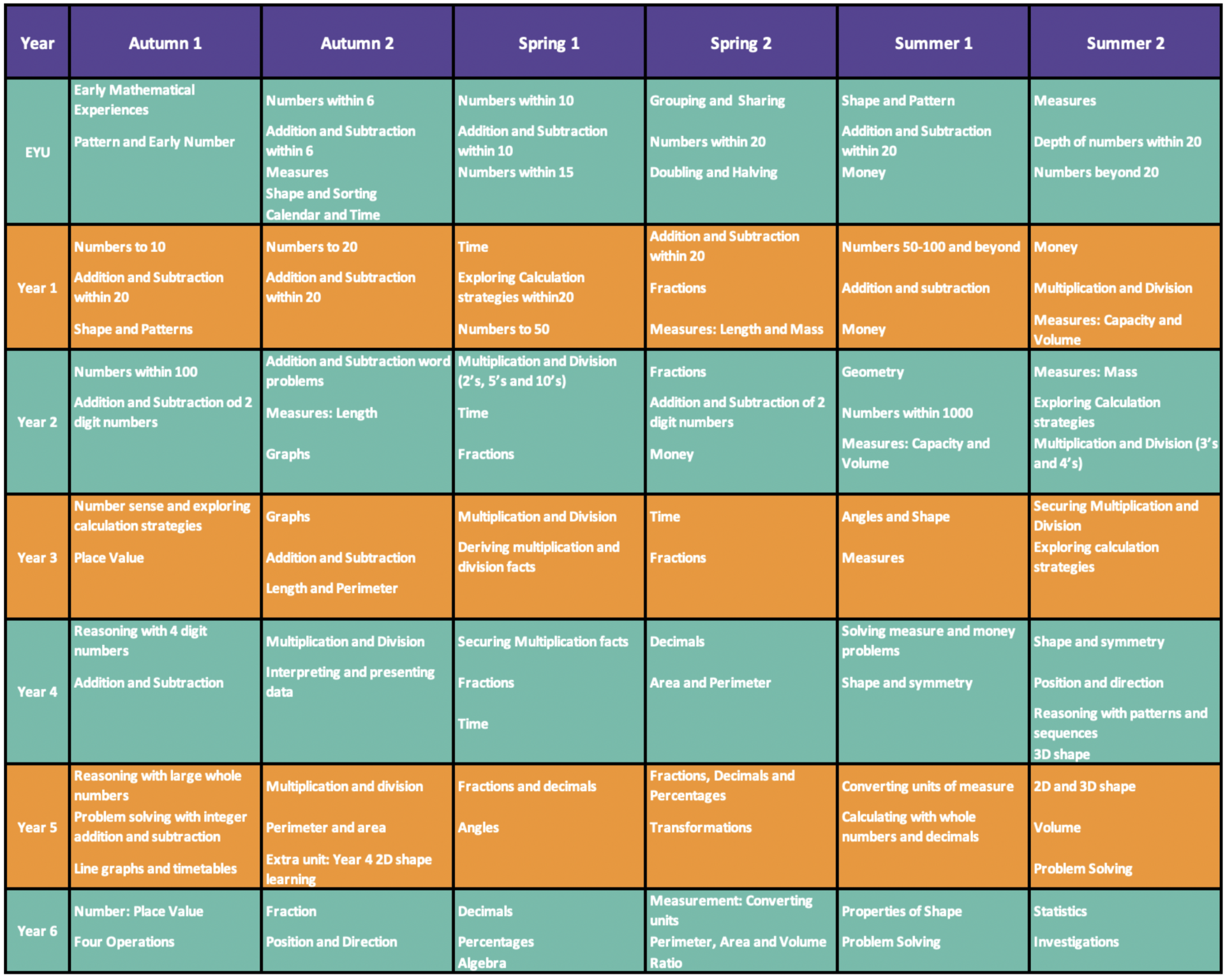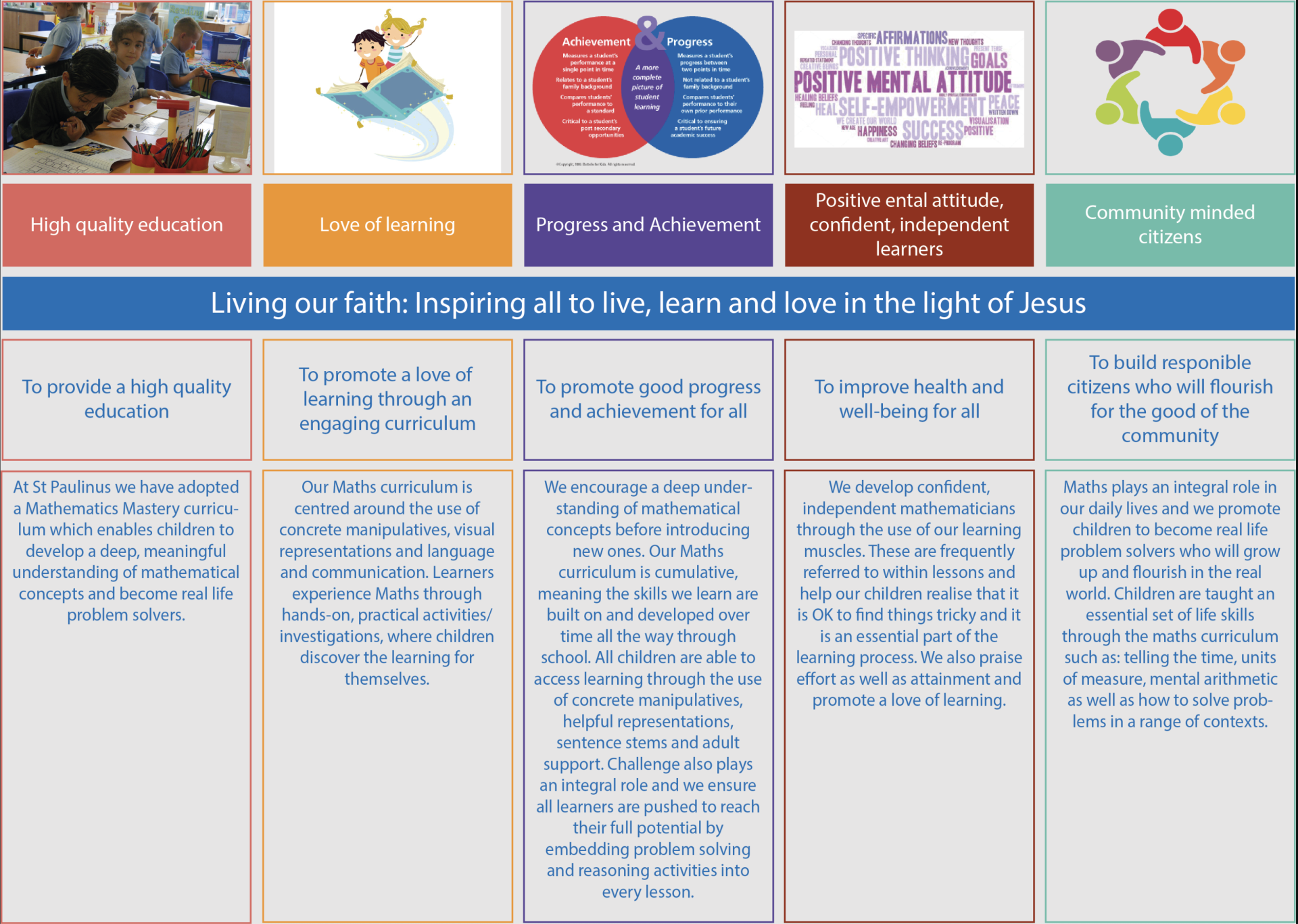Look at the amazing things going on in Mathematics at St Paulinus
Curriculum Intent:
How do we intend to achieve our curriculum vision in Mathematics lessons?
Mathematics is a creative and highly inter-connected discipline that has been developed over centuries, providing the solution to some of history’s most intriguing problems. It is essential to everyday life, critical to science, technology and engineering, and necessary for financial literacy and most forms of employment. A high-quality mathematics education therefore provides a foundation for understanding the world, the ability to reason mathematically, an appreciation of the beauty and power of mathematics, and a sense of enjoyment and curiosity about the subject. (DfE, 2013)
At St Paulinus, we follow the National Curriculum which aims to ensure that all pupils:
- become fluent in the fundamentals of mathematics, including through varied and frequent practice with increasingly complex problems over time, so that pupils develop conceptual understanding and the ability to recall and apply knowledge rapidly and accurately.
- reason mathematically by following a line of enquiry, conjecturing relationships and generalisations, and developing an argument, justification or proof using mathematical language
- can solve problems by applying their mathematics to a variety of routine and non-routine problems with increasing sophistication, including breaking down problems into a series of simpler steps and persevering in seeking solutions.
As mathematics is an interconnected subject, learners are required to fluently move between different representations of mathematical ideas. Although the programmes of study are organised into distinct units, pupils are given lots of opportunity to make rich, meaningful connections across mathematical ideas, so that they develop mathematical problem solving and reasoning skills. Links to other subjects are also explicitly highlighted within the mathematics curriculum. In using a mastery approach to the mathematics curriculum, the majority of children are expected to progress at broadly the same pace. However, decisions on when to progress are based on the security of their understanding. For learners who grasp a concept quickly, challenges are planned for which give them the opportunity to solve rich and sophisticated problems before accelerating through new content. Similarly, those learners who are not fully fluent with concepts have the opportunity to consolidate their understanding through targeted Do Now tasks (see subject policy), differentiated activities and/or daily intervention.

Curriculum Implementation:
What does Mathematics teaching look like?
At St Paulinus, children receive five maths lessons each week. As well as daily maths lessons, children take part in frequent ‘Maths Meetings’. These are short sessions aimed at consolidating previous knowledge and even pre-teaching upcoming units of work. They cover a variety of mathematical concepts (including those units which may only appear once per year group) so that learning is rarely forgotten and constantly utilised. All children are required to take part in Maths Meetings and do so through songs, quick-fire quizzes, the use of manipulatives or recording an answer on their whiteboard. Maths meetings are designed to be short, fun sessions that embed key concepts within the mathematics curriculum.
Our daily lessons follow a six-part structure: Do Now, New Learning, Talk Task, Develop Learning, Independent Task and Plenary.
Do Now – This part of the lesson in designed to revisit and consolidate previous learning – it can link to the current topic being taught or can be revision from a previous unit of work. Children are expected to complete this part of the lesson independently and achieve success. It is often displayed on the board or printed out for children to complete immediately at the start of each maths lesson.
New Learning – Here, children come together as a whole class and are introduced to the focus of the lesson. They discuss the Key Learning (learning objective) and the Star Words (Key Vocabulary) for the lesson/unit are shared. Some star words may have an action that the children perform when reading aloud. In this part of a lesson, children are shown a series of fluency style problems by the teacher to develop their basic understanding of the concept being taught. Children will be required to work through some examples alongside the class teacher and some examples independently.
Talk Task – Children work in mixed ability pairs for this section of the lesson. They are given a problem to work through/examples to complete. Before the children complete their Talk Tasks, the expectations are clearly set by the teacher and often modelled with other adults in the class. Children are required to use a range of manipulatives, representations and/or sentence stems to complete the task. Children are expected to practise using the Star Words in the correct context during this part of the lesson.
Develop Learning – Children are brought back together as a whole class. Any misconceptions from the Talk Task are cleared up and children and work through a series of examples that require some element of problem-solving or reasoning. This can come in a variety of ways, such as: true or false, odd one out, spot the mistake, always, sometimes, never, show me, convince me, this is the answer what is the question etc style activities.
Independent Task – Children are given time to apply their knowledge independently/as part of a small group. Children are encouraged to use the manipulatives, representations and sentence stems that were used in the lesson to help them complete their work
Plenary – Time allocated to address any misconceptions/extend pupils’ learning. This may be done throughout the lesson rather than at the end.
In year groups that move between a carpet space and tables, Transition activities are used so that all lesson time is utilised. This is done through chanting number bonds, timetable facts or counting in sequences as the children move from one space to another.
Problem solving and reasoning is at the heart of all our maths lessons and throughout each unit of work we have a clear focus on language and communication, conceptual understanding and mathematical thinking. These elements are embedded within lessons so that all children have experience of problem solving and reasoning.
Once children have completed their maths work they are given a Marking Sticker to complete. This has three sections: Practise, Going Deeper and Personal Next Steps (see subject policy).
Further up the school, children also receive weekly discrete Arithmetic lessons.
Curriculum impact:
What do our outcomes in Mathematics look like? How successful is our Mathematics teaching?
Below you will find some data from the last two years so you can see how our children are progressing in Maths. We also have some quotes from children when asked about their Maths work.





